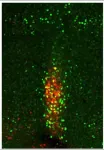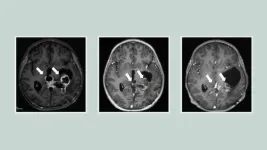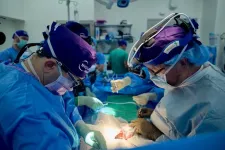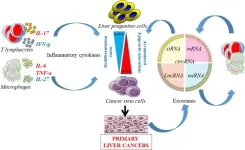(Press-News.org) Blood Factor Can Turn Back Time in the Aging Brain
Platelets are behind the cognitive benefits of young blood, exercise and the longevity hormone klotho
In a remarkable convergence, scientists have discovered that the same blood factor is responsible for the cognitive enhancement that results from young blood transfusion, the longevity hormone klotho, and exercise.
In a trio of papers appearing in Nature, Nature Aging and Nature Communications on August 16, 2023, two UCSF teams and a team from the University of Queensland (Australia), identify platelet factor 4 (PF4) as a common messenger of each of these interventions.
As its name suggests, PF4 is made by platelets, a type of blood cell that alerts the immune system when there is a wound and helps to form clots. It turns out that PF4 is also a cognitive enhancer. Under its influence, old mice recover the sharpness of middle age and young mice get smarter.
“Young blood, klotho, and exercise can somehow tell your brain, “Hey, improve your function,” said Saul Villeda, PhD, associate director of the UCSF Bakar Aging Research Institute and the senior author on the Nature paper. “With PF4, we’re starting to understand the vocabulary behind this rejuvenation.”
Villeda led the study on young blood, which was published in Nature. Dena Dubal, MD, PhD, UCSF professor and David A. Coulter Endowed Chair in Aging and Neurodegenerative Disease, led the study on klotho, which was published in Nature Aging. Tara Walker, PhD, professor of neuroscience at the University of Queensland, led the study on exercise, which was published in Nature Communications.
They committed to releasing their findings at the same time to make the case for PF4 from three different angles.
“When we realized we had independently and serendipitously found the same thing, our jaws dropped,” Dubal said. “The fact that three separate interventions converged on platelet factors truly highlights the validity and reproducibility of this biology. The time has come to pursue platelet factors in brain health and cognitive enhancement.”
Platelets quell the inflammation of an aging brain and body
Villeda is an expert on parabiosis, an experiment in which two animals are linked together by their blood circulation. When a young, sprightly animal is connected to an aging animal, the aging animal becomes more youthful–its muscles more resilient, its brain more capable of learning.
In 2014, Villeda found that plasma, consisting of blood minus red blood cells, mimicked parabiosis: young blood plasma, injected into old animals, was restorative. When his team compared young plasma to old plasma, they found it contained much more PF4.
Just injecting PF4 into old animals was about as restorative as young plasma. It calmed down the aged immune system in the body and the brain. Old animals treated with PF4 performed better on a variety of memory and learning tasks.
“PF4 actually causes the immune system to look younger, it's decreasing all of these active pro-aging immune factors, leading to a brain with less inflammation, more plasticity and eventually more cognition,” Villeda said. “We’re taking 22-month-old mice, equivalent to a human in their 70s, and PF4 is bringing them back to function close to their late 30s, early 40s.”
Platelets ferry klotho’s signal for cognitive enhancement into the brain
A decade ago, Dubal, a member of the UCSF Weill Neurosciences Institute, showed that klotho enhances cognition in young and old animals and also makes the brain more resistant to age-related degeneration. But she knew its effects had to be indirect because klotho molecules, injected into the body, never reached the brain. Dubal’s team found that one connection was PF4, released by platelets after an injection of klotho.
PF4 had a dramatic effect on the hippocampus, the brain region responsible for making memories, where it enhanced the formation of new neural connections at the molecular level.
It also gave both old and young animals a brain boost in behavioral tests, suggesting that “there’s room to go even in young brains to improve cognitive function,” according to Dubal.
Other recent findings from Dubal have bolstered the prospects for using klotho therapeutically. Klotho’s benefits depend on the activation of platelets, leading to the release of PF4 and other molecules, which could each have their own benefits during aging.
“Ideally, we’ll have multiple shots on goal for one of our biggest biomedical problems, cognitive dysfunction, with the fewest side effects and the most benefit,” Dubal said.
Exercise also improves brain health via platelets
Exercise can keep the mind sharp for decades. Walker and her lab found that platelets released PF4 into the bloodstream following exercise. When she tested PF4 on its own, as Dubal and Villeda also had, it improved cognition in old animals.
“For a lot of people with health conditions, mobility issues or of advanced age, exercise isn’t possible, so pharmacological intervention is an important area of research,” Walker said. “We can now target platelets to promote neurogenesis, enhance cognition and counteract age-related cognitive decline.”
Co-authors: Additional UCSF authors on the Nature paper are Adam B. Schroer, PhD, Patrick B. Ventura, PhD, MS, Juliana Sucharov, Rhea Misra, M. K. Kirsten Chui, Gregor Bieri, PhD, Alana M. Horowitz, PhD, Lucas K. Smith, Katriel Encabo, MPH, Imelda Tenggara, June M. Chan, ScD, and Anthony Luke, MD, MPH. Additional UCSF authors on the Nature Aging paper are Cana Park, PhD, Oliver Hahn, PhD, Shweta Gupta, PhD, Arturo J. Moreno, Francesca Marino, Dan Wang, MD, MS, Saul Villeda, PhD. Additional UCSF authors on the Nature Communications paper are Adam B. Schroer, PhD, Gregor Bieri, PhD, Saul Villeda, PhD. For all authors, see the papers.
Funding: The research was supported, in part, by the National Institutes of Health (Nature: AG064823, AG081038, AG077816, and AG067740; Nature Aging: NS092918, AG068325; Nature Communications: R01AG077816), as well as philanthropy. For all funding sources, see the papers.
Disclosures: see the papers.
About UCSF: The University of California, San Francisco (UCSF) is exclusively focused on the health sciences and is dedicated to promoting health worldwide through advanced biomedical research, graduate-level education in the life sciences and health professions, and excellence in patient care. UCSF Health, which serves as UCSF's primary academic medical center, includes top-ranked specialty hospitals and other clinical programs, and has affiliations throughout the Bay Area. UCSF School of Medicine also has a regional campus in Fresno. Learn more at https://ucsf.edu, or see our Fact Sheet.
###
Follow UCSF
ucsf.edu | Facebook.com/ucsf | YouTube.com/ucsf
END
Blood factor can turn back time in the aging brain
2023-08-16
ELSE PRESS RELEASES FROM THIS DATE:
How cold temperatures trigger the brain to boost appetite
2023-08-16
LA JOLLA, CA—Neuroscientists at Scripps Research have identified brain circuits that make mammals want to eat more when they are exposed to cold temperatures.
Mammals automatically burn more energy to maintain normal body temperature when exposed to cold. This cold-activated increase in energy expenditure triggers an increase in appetite and feeding, although the specific mechanism controlling this had been unknown. In the new study, reported on August 16, 2023, in Nature, the researchers identified a cluster of neurons that work as a “switch” for this cold-related, food-seeking behavior in mice. The discovery could lead to potential ...
Microplastic pollution: Plants could be the answer
2023-08-16
Could plants be the answer to the looming threat of microplastic pollution? Scientists at UBC’s BioProducts Institute found that if you add tannins—natural plant compounds that make your mouth pucker if you bite into an unripe fruit—to a layer of wood dust, you can create a filter that traps virtually all microplastic particles present in water.
While the experiment remains a lab set-up at this stage, the team is convinced that the solution can be scaled up easily and inexpensively once they find the right industry partner.
Microplastics ...
Directly involved war veterans exhibit nearly twice the PTSD symptoms years after 2014 Israel-Gaza conflict, affecting parents' well-being
2023-08-16
Hebrew University researchers, Shahaf Leshem, Eldad Keha, and Prof. Eyal Kalanthroff, have unveiled significant findings regarding the lasting psychological impacts stemming from the 2014 Israel-Gaza military conflict. The study sheds light on the deep repercussions of trauma for both war veterans and their parents. Notably, veterans directly involved in the conflict exhibited nearly twice the level of PTSD symptoms compared to indirectly active veterans, a difference persisting even five years after the conflict. Remarkably, ...
Study finds improved survival for incurable brain tumor, providing ‘a crack in the armor’
2023-08-16
Michigan — For the first time, researchers have found a potential drug candidate that improved outcomes for patients with a type of childhood brain tumor for which there are no effective treatments. The compound, called ONC201, nearly doubled survival for patients with diffuse midline glioma (DMG) or diffuse intrinsic pontine glioma (DIPG), compared to previous patients.
The findings are reported by an international team of researcher led by the University of Michigan Health Rogel Cancer Center and the Chad Carr Pediatric Brain Tumor Center.
In addition to reporting on the results of two early stage clinical ...
Pig kidney xenotransplantation performing optimally after 32 days in human body
2023-08-16
NEW YORK, NY, AUGUST 16, 2023 — Surgeons at NYU Langone Health have transplanted a genetically engineered pig kidney that continues to function well after 32 days in a man declared dead by neurologic criteria and maintained with a beating heart on ventilator support. This represents the longest period that a gene-edited pig kidney has functioned in a human, and the latest step toward the advent of an alternate, sustainable supply of organs for transplant.
Multimedia Materials Available
Multimedia materials, including photos and a B-roll package, are available for download.
About the Procedure
The procedure, performed on July 14, 2023, and led by Robert Montgomery, ...
ASBMB names 2024 award winners
2023-08-16
The American Society for Biochemistry and Molecular Biology announced today the winners of its annual awards. Colleagues and other leaders in the field nominated the winners for making significant contributions to biochemistry and molecular biology and the training of emerging scientists.
The recipients will give talks about their work at the society’s 2024 annual meeting, Discover BMB, slated for March 23–26 in San Antonio.
In addition to cash prizes ranging from $2,000 to $35,000, each ASBMB award consists of a plaque and transportation ...
New and updated resources published to help guide oncology care in the Middle East and North Africa (MENA)
2023-08-16
PLYMOUTH MEETING, PA [August 16, 2023] — The National Comprehensive Cancer Network® (NCCN®)—an alliance of leading cancer centers—today announced that a library of resources for improving cancer care in the Middle East and North Africa (MENA) has been updated and expanded in collaboration with regional experts. The United States-based non-profit has worked with the King Abdulaziz Medical City in Riyadh, Saudi Arabia, since 2015 to standardize cancer treatment based on the latest evidence and expert-consensus, as part of the MENA-NCCN Regional Coordinating Center. Their efforts have led to the ...
Gray wolf recovery is a success—is that a problem?
2023-08-16
Over the past 30 years, efforts to recover gray wolf populations in the United States have been broadly successful, with many regions now sporting robust populations of the charismatic carnivore. Writing in BioScience, wolf experts David E. Ausband and L. David Mech describe the conservation landscape and also the obstacles that wolves face as their populations expand into their historical ranges.
"Remarkable wolf conservation success yields remarkable challenges," ...
Common wristbands ‘hotbed’ for harmful bacteria including E. coli, staphylococcus
2023-08-16
The COVID-19 pandemic took disinfecting to new heights. Now, a new study examining a commonly used item might convince you not to let your guard down just yet.
Researchers from Florida Atlantic University’s Charles E. Schmidt College of Science tested wristbands of various textures to determine their risk for harboring potentially harmful pathogenic bacteria. Despite being worn daily, routine cleaning of wristbands is generally overlooked or simply ignored.
For the study, researchers tested plastic, rubber, cloth, leather ...
What is the next step in preventative therapies for treating liver cancer?
2023-08-16
Primary liver cancers ranked as the sixth most commonly diagnosed cancers and the third leading cause of cancer-related death in 2020. Among all primary liver cancers, HCC is the most common cancer, accounting for more than 80% of cases with a 5-year survival rate of less than 10% in Western countries. Despite significant progress in diagnosis and treatments, HCC, often diagnosed at late stages, remains a life-threatening disease with an increasing incidence. Therefore, a better understanding of the underlying mechanisms triggering the early steps of tumorigenesis represents a great interest to predict and propose more effective therapeutic ...





